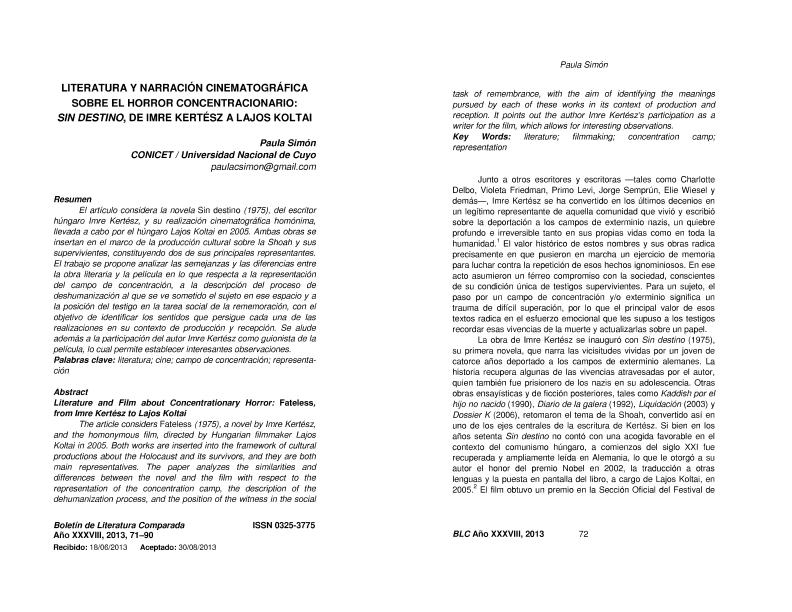Mostrar el registro sencillo del ítem
dc.contributor.author
Simón, Paula Cecilia

dc.date.available
2016-08-16T18:20:12Z
dc.date.issued
2013-12
dc.identifier.citation
Simón, Paula Cecilia; Literatura y narración cinematográfica sobre el horror concentracionario: Sin destino, de Imre Kertész a Lajos Koltai; Universidad Nacional de Cuyo. Facultad de Filosofía y Letras. Centro de Literatura Comparada; Boletín de Literatura Comparada; 38; 12-2013; 71-90
dc.identifier.issn
0325-3775
dc.identifier.uri
http://hdl.handle.net/11336/7184
dc.description.abstract
El artículo considera la novela Sin destino (1975), del escritor húngaro Imre Kertész, y su realización cinematográfica homónima, llevada a cabo por el húngaro Lajos Koltai en 2005. Ambas obras se insertan en el marco de la producción cultural sobre la Shoah y sus supervivientes, constituyendo dos de sus principales representantes. El trabajo se propone analizar las semejanzas y las diferencias entre la obra literaria y la película en lo que respecta a la representación del campo de concentración, a la descripción del proceso de deshumanización al que se ve sometido el sujeto en ese espacio y a la posición del testigo en la tarea social de la rememoración, con el objetivo de identificar los sentidos que persigue cada una de las realizaciones en su contexto de producción y recepción. Se alude además a la participación del autor Imre Kertész como guionista de la película, lo cual permite establecer interesantes observaciones.
dc.description.abstract
The article considers Fateless (1975), a novel by Imre Kertész, and the homonymous film, directed by Hungarian filmmaker Lajos Koltai in 2005. Both works are inserted into the framework of cultural productions about the Holocaust and its survivors, and they are both main representatives. The paper analyzes the similarities and differences between the novel and the film with respect to the representation of the concentration camp, the description of the dehumanization process, and the position of the witness in the social task of remembrance, with the aim of identifying the meanings pursued by each of these works in its context of production and reception. It points out the author Imre Kertész’s participation as a writer for the film, which allows for interesting observations.
dc.format
application/pdf
dc.language.iso
spa
dc.publisher
Universidad Nacional de Cuyo. Facultad de Filosofía y Letras. Centro de Literatura Comparada
dc.rights
info:eu-repo/semantics/openAccess
dc.rights.uri
https://creativecommons.org/licenses/by-nc-sa/2.5/ar/
dc.subject
Literatura
dc.subject
Cine
dc.subject
Campo de Concentración
dc.subject
Representación
dc.subject
Literature
dc.subject
Filmmaking
dc.subject
Concentration Camp
dc.subject
Representation
dc.subject.classification
Otras Lengua y Literatura

dc.subject.classification
Lengua y Literatura

dc.subject.classification
HUMANIDADES

dc.title
Literatura y narración cinematográfica sobre el horror concentracionario: Sin destino, de Imre Kertész a Lajos Koltai
dc.title
Literature and Film about Concentrationary Horror: Fateless, from Imre Kertész to Lajos Koltai
dc.type
info:eu-repo/semantics/article
dc.type
info:ar-repo/semantics/artículo
dc.type
info:eu-repo/semantics/publishedVersion
dc.date.updated
2015-10-15T19:54:53Z
dc.journal.number
38
dc.journal.pagination
71-90
dc.journal.pais
Argentina

dc.journal.ciudad
Mendoza
dc.description.fil
Fil: Simón, Paula Cecilia. Universidad Nacional de Cuyo. Facultad de Filosofia y Letras; Argentina. Consejo Nacional de Investigaciones Científicas y Técnicas. Centro Científico Tecnológico Mendoza; Argentina
dc.journal.title
Boletín de Literatura Comparada
dc.relation.alternativeid
info:eu-repo/semantics/altIdentifier/url/http://ffyl1.uncu.edu.ar/spip.php?rubrique1326
Archivos asociados
